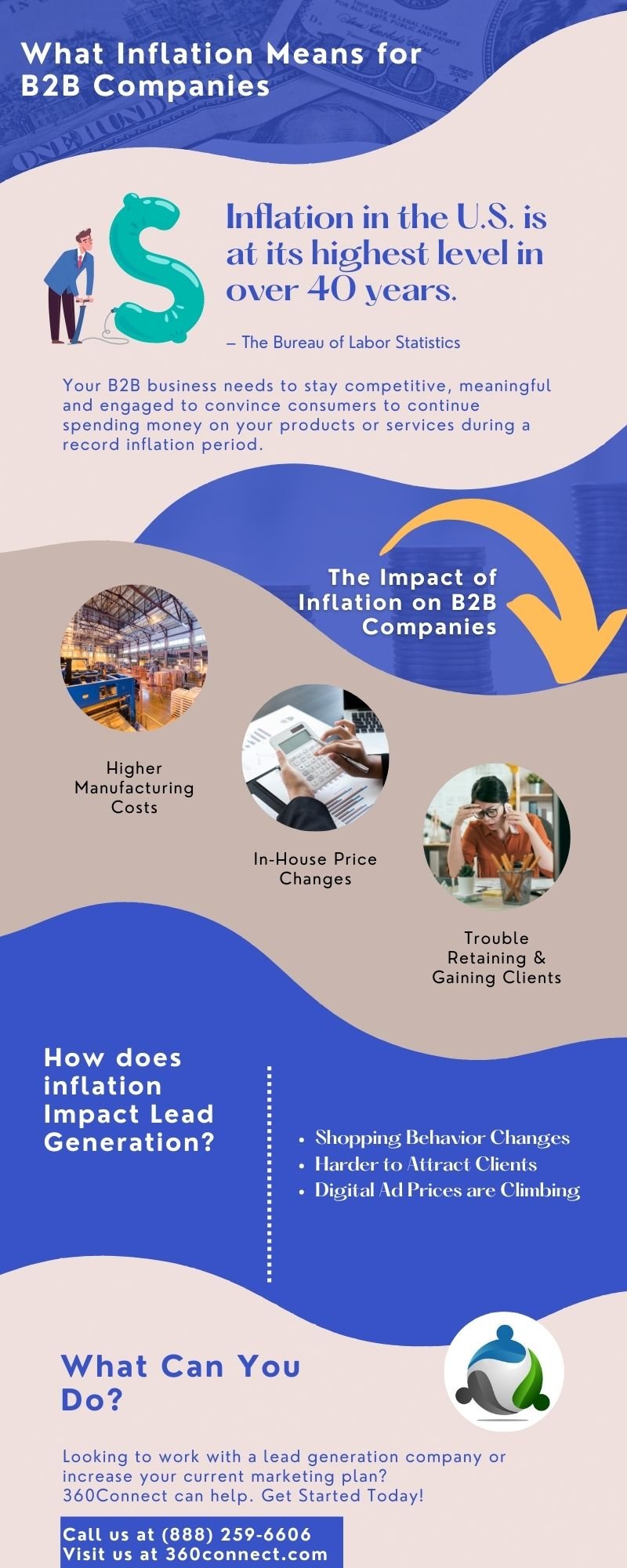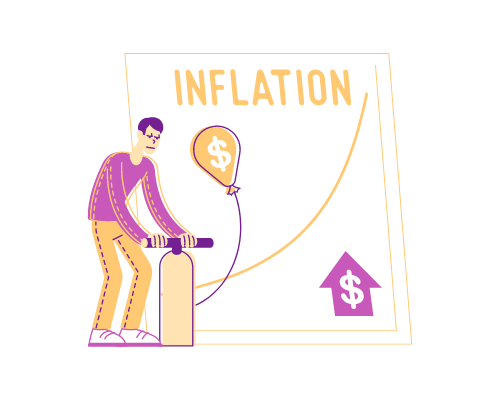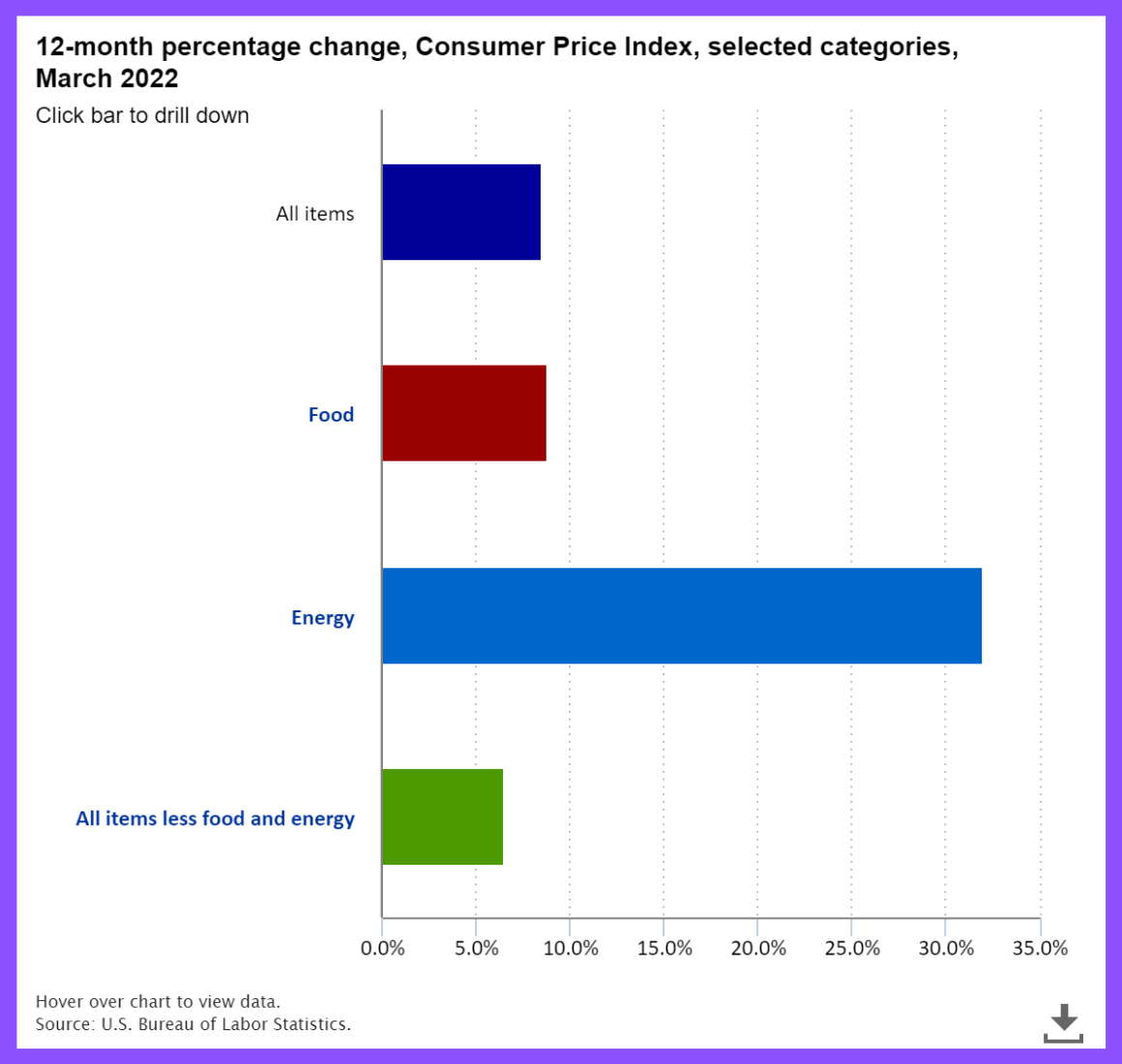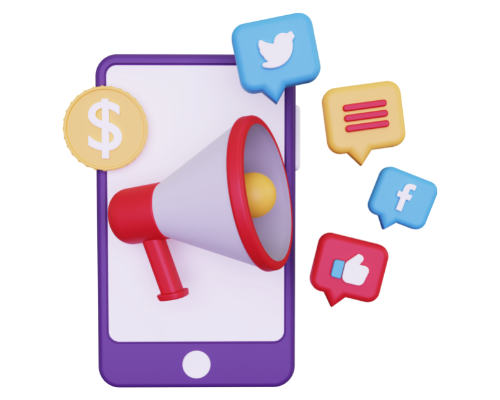Everyday essentials like gas, food, housing, and more are rapidly rising in price. And for B2B businesses specifically, you’ve likely already experienced markups in the materials needed to keep your business operating. So, what is the cause for this? Simply put, inflation.
Your B2B business needs to stay competitive, meaningful and engaged to convince consumers to continue spending money on your products or services, and that’s not an easy task. Essentially you’re balancing how inflation impacts your company and your customer’s business and trying to keep both employees and customers happy. Did we mention you’re also running a business and depending on generating sales through marketing at the same time? Let’s dive deeper into exactly how inflation impacts B2B Sales & Marketing, and how you can stay afloat.

What is Causing Inflation and How Will It Impact Your B2B Business?
The United States is experiencing its highest inflation rate in forty years, and the rate is accelerating worldwide. The immediate cause of inflation is hard to pinpoint, but much of it is a snowball effect starting with the impact of Covid-19, supply chain crisis, increase in demand and the Russian invasion of Ukraine. A lot has happened, and in the past 2 years, it seems like most people haven’t had time to take a breath with soaring inflation. But how is inflation impacting B2B Sales & Marketing specifically?
With inflation, many suppliers’ first course of action is to adjust their prices quickly and efficiently to avoid margin decreases. The longer they wait to act, the faster the decline in profits. And with increased pricing comes a need to sell more, let’s take a look at the 5 ways inflation is impacting B2B Companies.

5 Ways Inflation is Impacting B2B Companies
Inflation isn’t just affecting consumers. The rising cost of raw materials is forcing industrial companies to adjust their prices quickly. For example, lumber prices have soared more than 75 percent higher than the pre-pandemic record. Along with rising costs of lumber, other raw materials like copper, steel, and more are adding up quickly for B2B suppliers.
Because there is an increase in the cost of input goods used in manufacturing, the cost of manufacturing also increases. So, if you’ve normally bought from a manufacturer to run your supplier business, you may have noticed increased prices. This is a tactic manufacturers are using to offset their costs to supplier customers. So, where does that leave your B2B business?
Companies in the B2B sector are experiencing inflationary costs in all areas across the board. That includes raw materials, labor, energy, and more. The fact remains that most B2B companies are not prepared to absorb the rising costs. So while price increases may not be ideal on any end, they’re becoming the only option for many. Inflation is causing numerous B2B businesses to make in-house price changes.
Price changes are often not taken lightly in any situation. Now is the time to work with your team to understand your options, set pricing accordingly, and retain honest communication with current and new clients.
Inflation isn’t only causing price increases. Some businesses are taking the additional step to start introducing new features. Because price changes are seldom received well, many B2B companies are anticipating this by offering other features included with the price increase. Typically, the services will not cost the company money and help keep customers on good terms. Examples include bundled services and adjusted service levels. Etc.
As a result of inflation, a company’s costs rise in theory, but in reality, they are passed along to the customer. Having already been affected by inflation for essentials like gas, food, and living, customers may not be able to handle increased prices of goods and begin to ask the following questions.
- Do I need a vendor?
- What are my other options?
- Can we do it ourselves?
Shipping costs have increased sharply since the pandemic, and continue to rise. In a study done by the International Monetary Fund, they examined data and found that shipping costs are an important driver of inflation. Meaning the increase in shipping costs in 2021 could increase inflation by 1.5 percent in 2022. As a result, rising costs could force suppliers to pass these costs along to consumers to a greater extent than usual.
How does Inflation Impact Lead Generation?
It’s clear that inflation is affecting both consumers and suppliers, but how is it impacting lead generation? First, let’s look at the stats.

Fast Stats on Inflation
- Inflation in the U.S. is at its highest level in over 40 years.
- The US saw its largest 12-month inflation increase since June 1982 on January 12th, 2022.
- Consumer prices increased by 8.5 percent for the year ended March 2022
- According to the U.S. Bureau of Labor Statistics, from March 2021 to March 2022 consumer prices of
- Energy increased by 32 percent
- Fuel oil increased by 70.1 percent
- Gasoline increased by 48 percent
- Electricity increased by 11.1 percent
- And natural gas increased by 21.6 percent

Inflation is impacting necessities like food and energy. This is likely impacting how consumers are spending their money. Let’s take a look at a few ways inflation impacts B2B business lead generation.
Shopping Behavior Changes
Price increases impact American citizens’ everyday lives, as you saw in the inflation statistics. You’ve probably also found yourself comparing supermarkets or gas station prices. Like your want to find a good deal, inflation has caused many shoppers to seek lower prices for products and services. However, in a period where price increases are required on your end, this leads to difficulty generating leads. The primary purpose of lead generation is to attract prospects to your business, but what happens when the game has changed? And your customers are more hesitant than ever to buy? Shopping behavior changes are happening fast, so unless you have a lead generation campaign in place, you will lose valuable clients to your competitors.


Harder to Attract Clients
Have you implemented price increases? Or you’re thinking about it? Clients are more likely to stomach a rate increase when they believe a vendor delivers quality results and a good experience. However, if the client has never worked with you, this can be tough for lead generation.
While increased pricing may be a good move for your business, it does come with added difficulty in attracting clients.
Digital Ad Prices are Climbing
Campaigns that used to be bulletproof may need more money to attract the ideal type of customers, or you’ll need to go to the drawing board to handle the new beast inflation created. In addition, inflation is also impacting the cost of online ads. TikTok, Meta, Google, Amazon, and more have been trending upward.

What Can You Do?
Shopping behavior changes, it’s harder to attract new clients, and there’s increased pricing. Inflation can be overwhelming for B2B companies. So, what can you do?
1. Be Transparent
Inflation is not a secret, it’s prevalent all around us. Therefore, be transparent with current clients and leads about your price changes if any.
2. Review Customer Strategy
Take a step back and review your customer strategy. Are you still targeting the right consumers in the face of price increases or service changes? Are these value-seeking or price-sensitive customers? Should you consider adding more features to current packages as a trade-off? Refresh yourself on the customer strategy and if updates are needed.
3. Work with a Lead Generation Company
A lead generation company specializes in attracting prospects to your business. Now more than ever, it’s vital that your business stays ahead of the curve to retain and attract long-lasting customers.
4. Increase Marketing Budget
Whether you handle your marketing and lead generation in-house or outsource it, it may be best to increase your marketing budget. Increased pricing and a change in strategy likely mean you’ll need to expand your marketing budget.
Final Thoughts on B2B Inflation
Inflation will have a different impact on all businesses, but with the right approach, you can stay afloat. During the pandemic, many companies gave customers pricing relief, which helped many gain a good brand reputation. Despite this many are stuck in a pricing rut, even without inflation.
Thus, now is a good time to price your products and services with confidence as inflation rises. It won’t be easy, but with a good strategy, correct expectations, and a lead generation company you can grow revenue during a difficult period.
Get Started Today
Are you looking to work with a lead generation company or increase your current marketing plan? 360Connect can help. We understand market trends and the current inflation crisis impacting the nation and the world. Let us help source high-quality, true-intent prospects and deliver them directly to you daily.

